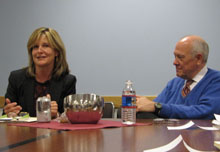
November 3, 2009 — Kathleen Parker spoke at the Shorenstein Center brown-bag lunch about “The Problem with Punditry,” drawing on her experience as a syndicated columnist for The Washington Post Writers Group. Shorenstein Center director Alex S. Jones introduced Parker as one who “thinks for herself, writes like a dream,” but Parker called herself a “reluctant pundit.”
Parker noted that in the culture of punditry, “you have to be defined as a certain thing … because you have to have a fight, a conflict.” Instead of being “thoughtful, nuanced, careful, considerate,” Parker said, a successful pundit has to be “provocative and entertaining.”
The danger with punditry, Parker said, is that “this vacuous tendency of pundits to say nothing very quickly” threatens to create an “uninformed citizenry,” and a well-informed public is “essential to a successful functioning democracy.”
When asked about the Republican Party, Parker said that during the 2008 presidential campaign, the party began to be more divided, and “the tenor and the tone of the message became so abrasive, and that needs to change.” She said that the party “needs leadership, and right now there is no particular person that comes to mind.”
As a columnist, Parker faces many attacks for her opinions, but as a woman, she says, “attacks are more personal.” In responding to negative criticism, Parker says she tries to “always take the high road.” “It’s a nice view,” she says, “but it’s lonely up there.”
This article was written by Janell Sims and the photo taken by Leighton Walter Kille, both of the Shorenstein Center.

